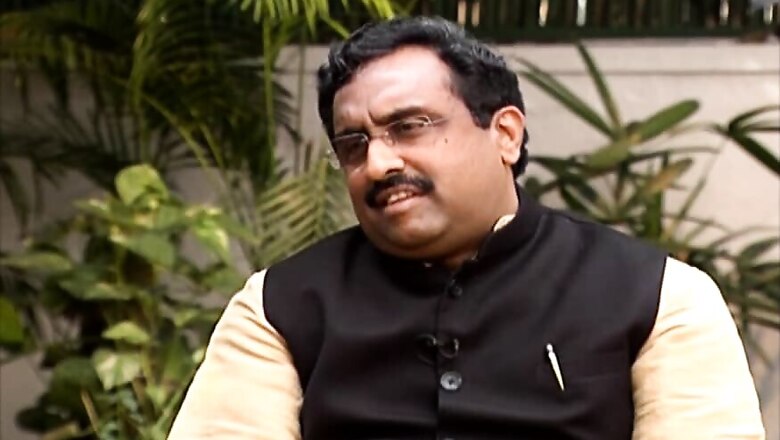
views
New Delhi: With the October 23 announcement made by Union Home Minister Rajnath Singh of appointing former director of Intelligence Bureau, Dineshwar Sharma, to resume political engagement with Kashmir, questions are being asked about government’s policy towards Kashmir.
Is this appointment an admission of failure of its ‘muscular’ Kashmir policy? What has prompted this new level of engagement with Kashmiri leaders? Will the government appointed representative, Sharma, talk to the separatists?
To answer these questions we turned to none other than BJP’s in-charge of Kashmir and North East – Ram Madhav.
In this interview with News18, Madhav says that government of India’s representative will speak to the Hurriyat if it wants, that the dialogue initiated through Dineshwar Sharma “cannot be an unending process”, and claims that BJP government’s policy towards Kashmir has always remained consistent.
Do you think the situation in Kashmir is more fragile than ever before?
No the situation isn’t fragile anymore. Things have gradually settled down. Normal political activity has also started. The state government coalition of BJP and PDP is now focusing more and more on development.
So why has a special representative been appointed then?
A special representative has been appointed to talk to different groups in the state. You see, from our side, from the home minister's side, we have always said that the government’s doors are always open for the groups which want to talk to the government. It also should be understood that these talks cannot be held by the Home Minister or somebody from that level. So the government has decided that Dineshwar Sharma will be government of India’s representative to talk to different groups. Talking was never an option that we had closed.
All we had said was that you cannot indulge in violence and also expect to hold a dialogue with us. Now if you genuinely feel the need to engage in talks with the government of India, Sharma is our representative.
You know you are talking about holding a sustained dialogue a time when security forces are seen to have an upper hand in the valley. Is the initiation of a dialogue process an acknowledgement that your muscular approach in the valley has failed?
I won't call it a muscular approach. I will only say that tackling Kashmir insurgency and terrorism issues calls for multi-pronged approach. So different activities will be carried out simultaneously. One of them is to tackle terrorists through strong military action.
What is the brief of Dineshwar Sharma? Does it also include talking to the Hurriyat?
As Home Minister himself has announced, Dineshwar Sharma will be talking to all the stake-holders who are willing to come forward and talk. In that if Hurriyat wants to come forward and talk to him, I am sure he will be open to it. Now whether Hurriyat is willing to talk to is a question you have to ask them.
But does it not signal a complete shift from your approach towards Hurriyat leadership. Let’s not forget that there is an NIA led investigation against Hurriyat leadership also going on?
Whoever is indulging in anti-national activities in the valley, whether in the form of indulging in terrorism or in the form of promoting it, sponsoring it, supporting it we will catch up with them. That will continue. But if somebody wants to come and talk to the central government as I’ve said earlier, they can come and talk.
So is this also an acknowledgement that the solution of the Kashmir problem is through dialogue?
As I’ve said, the Kashmir problem requires a multi-pronged approach. You will talk to sections that are ready to engage with you, but you will deal with sections, which are indulging in terror, in an appropriate manner also. So one has to understand that it not an either/or situation.
How is your initiative different from that taken up by UPA II?
It is very different. Some people say we have taken a U-turn. No, there is no U-turn in our policy towards Kashmir. We have one window open for those who want to talk to the government of India. There is a representative, he will try to engage with all sections.
But the opposition is saying, and here I’m quoting Ghulam Nabi Azad, is that the government is doing it at the fag-end of its tenure. And that this exercise is being done only for publicity, and that you really do not have a Kashmir policy. How do you respond to this criticism?
They had a “great” Kashmir policy which has landed the state in such a big turmoil and complete mess. This is the result of the so-called Kashmir policy of the Congress government. Today in power, we are employing various approaches in tackling the problem of Kashmir and we are sure that at the end of the day we will have an amicable solution to the problem.
If I were to stay with Ghulam Nabi Azad’s quote a for a few more moments, he has also said that in the last three-and-a-half years there seems to be some confusion in BJP’s K policy. Otherwise you wouldn’t have lost hundreds of civilians and security forces in the valley.
No, in the last three-and-a-half-years the policy has been absolutely consistent. If Azad is talking about losing people, let me remind him that when he was the Chief Minister, we lost crores of people. When he handed over the power to his alliance partners we had Amarnath land row in which 100 people were killed. So let him not lecture us about losing people.
Under their government, the loss of innocent lives has been maximum. Under this government, yes people are dying, but those who are dying are terrorists. And if Azad's sympathy is with terrorists, I can't help it. We are trying our best that civilian casualties are kept to a minimum.
You know there is a lot of criticism about your appointment of a former cop as a representative of the government to hold talks. Why did you choose a former IB chief? Why not somebody from the civil society?
First of all, I haven't seen any major criticism from the valley as such. People sitting in Delhi, leaders of certain political parties are responsible for the sad situation in the valley. They are making all sorts of noises in Delhi. In the valley, there is generally a hope that a window to talk to the government has opened. Our initiative is already receiving good reception from the valley. There is no criticism. Those who are criticising it are doing it for political reasons. And the decision to appoint him was taken by the honourable Prime Minister, Home Minister after due consultations. If a competent person is available to us then why not?
A section of Kashmir experts are of the view that for a long term solution to Kashmir you will have to talk to Pakistan. Now that you have taken the firsts step of appointing an interlocutor in the valley, is talking to Pakistan also an option open to your government?
There are way too many Kashmir experts in Delhi, which one are you talking about I do not know. But yes we will talk to Pakistan about Kashmir. There is a resolution of the Indian Parliament that we have to talk to them about the Pakistan Occupied Kashmir. If those experts mean that we have to talk about PoK then we have no problem. Otherwise the Kashmir issue is an internal matter of our government. We will talk to the people of the state, to different groups of the state. No outside power has any locus standi on it.
Do you think that this dialogue with Kashmir could also begin a process of reviewing AFSPA as well?
These are two different issues. There is a process of review that happens on a regular basis. But these two things have no link. AFSPA is needed there and that's why it is there.
There is a narrative on the ground, and I’m quoting the state’s Director General of Police where he said, that mainstream parties in the valley do not talk about India. How do you look at this comment? Don’t you think that the mainstream political parties, including the PDP should be drilling that point that Kashmiris should look at India as their own country?
Honestly, I have not seen the statement, but I have heard about it. As far as I know, the mainstream political parties whether it is the PDP or the National Conference are the mainstream political parties. They have always been in alliance with a mainstream national party, whether it was Congress earlier or the BJP now. So probably his intention was that there should be more talk about integration and Indianness. We should take it in good spirit. We are all working together under the Indian constitution.
Are you looking to hold this dialogue, through Dineshwar Sharma, in a time bound manner?
We have appointed a representative to engage with the groups. It cannot go on eternally. At some point we will say “alright that’s it”. What is the result of this dialogue we will asses later. While I wouldn't say comment on any specific timeline, the fact is dialogue cannot be an unending process. Dialogue has to start and end somewhere.
BJP is all set to hold its maiden executive meet in Srinagar. You’ve held executive party meets in Jammu in the past but this is the first time that senior party leaders will hold a meeting in the valley. What were the reasons behind it?
BJP has considerable presence in the valley. I do not call it a very strong presence but we have got our units in all the districts. We have a couple of MLCs. And we have active karyakarta groups in the valley. Also, we have held many programs there in the past as well. Not only at the time of elections, but also otherwise as well. We would go to district centers and hold programs and all. It's true that slowly our party's influence is growing in the valley that's why it has decided to hold the party's executive in Srinagar.
















Comments
0 comment